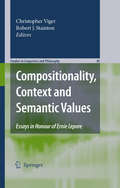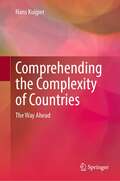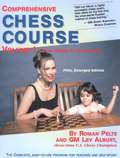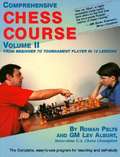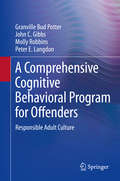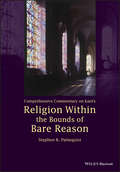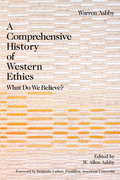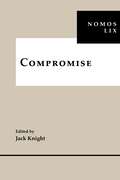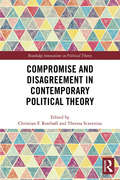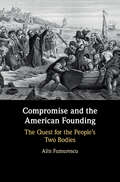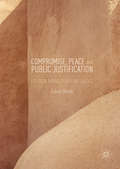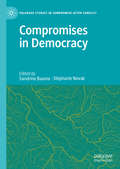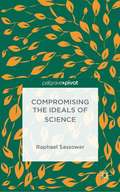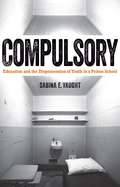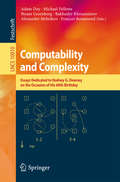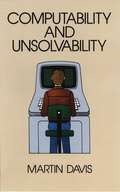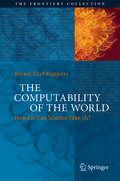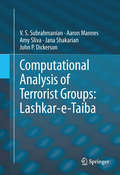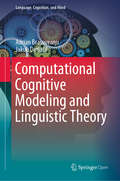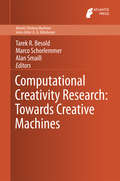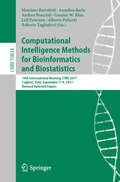- Table View
- List View
Compositionality, Context and Semantic Values: Essays in Honour of Ernie Lepore (Studies in Linguistics and Philosophy #85)
by Robert J. Stainton Christopher VigerAre natural languages genuinely compositional? What roles does context play in linguistic communication, and by what means? In particular, does context interfere with the compositional determination of truth conditions? What meanings should theorists assign to sentences if compositionality is to be retained? These are the central questions of this important volume of new philosophical essays in honour of Ernie Lepore.
Compreendendo o aspecto geocivilizacional do Ocidente: Um olhar histórico por meio de uma nova abordagem (Civilização e Cultura #1)
by Ahmed SarireteO consenso internacional construído em torno do modelo ocidental e sua abordagem civilizacional nas últimas décadas não demorou a mostrar sinais de fragilidade diante das crises estruturais induzidas pela pressão por uma globalização injusta. As dúvidas que suscitam a gestão pouco tranquilizadora deste projeto de globalização e as grandes crises globais, como a pandemia por Covid-19 que se alastrou por todas as nações, merecem, no entanto, uma pausa para reflexão aprofundada a fim de melhor compreender esta situação sem precedentes na história humana! Neste ensaio, dou a minha contribuição significativa na compreensão do novo processo civilizacional humano que se tornou um modelo único para todas as nações contemporâneas, de acordo com minha abordagem «geocivilizacional», oferecendo um olhar lúcido e sereno sobre as causas históricas da liderança dos ocidentais.
Comprehending the Complexity of Countries: The Way Ahead
by Hans KuijperThis book argues for computer-aided collaborative country research based on the science of complex and dynamic systems. It provides an in-depth discussion of systems and computer science, concluding that proper understanding of a country is only possible if a genuinely interdisciplinary and truly international approach is taken; one that is based on complexity science and supported by computer science. Country studies should be carefully designed and collaboratively carried out, and a new generation of country students should pay more attention to the fast growing potential of digitized and electronically connected libraries. In this frenzied age of globalization, foreign policy makers may – to the benefit of a better world – profit from the radically new country studies pleaded for in the book. Its author emphasizes that reductionism and holism are not antagonistic but complementary, arguing that parts are always parts of a whole and a whole has always parts.
Comprehensive Chess Course: Learn Chess in 12 Lessons (Comprehensive Chess Course Ser. #Volume I)
by Lev Alburt Roman PeltsThis book provides readers with all the essential information they need to learn chess and to start winning-quickly! The contents-tested and proven to work-leave little to chance. The reader learns the rules, how to apply them efficiently, the principles of winning chess, and how to visualize the board and pieces-all prerequisites for success.
Comprehensive Chess Course: From Beginner to Tournament Player in 12 Lessons (Comprehensive Chess Course #Volume II)
by Roman Pelts Lev AlburtWelcome to Volume II, the second level, of our Comprehensive Chess Course. It is aimed at those students who have completed and mastered the lessons in Volume I. In addition to numerous corrections and alterations to this, the third edition, a new chapter has been added, "Moving On to Expert and Master." It addresses the concerns of many readers who want a guide for consolidating the progress made during the study of volumes I and II and concrete suggestions for advancing toward expert and master.
A Comprehensive Cognitive Behavioral Program for Offenders: Responsible Adult Culture
by John C. Gibbs Granville Bud Potter Molly Robbins Peter E. LangdonThis book presents Responsible Adult Culture (RAC), a truly comprehensive program for helping offenders to think and act responsibly. It provides the tools of the program with great clarity. In addition to exploring the needs of all offenders, the book addresses the special needs of both female and dual-diagnosis offenders. Responsible thinking means habitually seeing others and situations accurately, rather than in self-serving and egocentrically distorted ways. Because self-centered thinking is typically reinforced by negative group norms, RAC starts with the cultivation of a constructive climate ("mutual help" groups) to motivate change. Motivated group members then gain tools for responsible thinking through "equipment" (cognitive behavioral) meetings. These tools pertain to social skills, anger management, and the correction of self-centered thinking through social perspective taking (cognitive restructuring). Beyond documented reductions in distorted thinking and recidivism rates, RAC's synergy or round-the-clock interpenetration of positive groups and tools promotes a safer and more humane institutional culture.
Comprehensive Commentary on Kant's Religion Within the Bounds of Bare Reason
by Stephen R. PalmquistPalmquist's Commentary provides the first definitive clarification on Kant's Philosophy of Religion in English; it includes the full text of Pluhar's translation, interspersed with explanations, providing both a detailed overview and an original interpretation of Kant's work. Offers definitive, sentence-level commentary on Kant's Religion within the Bounds of Bare Reason Presents a thoroughly revised version of Pluhar's translation of the full text of Kant's Religion, including detailed notes comparing the translation with the others still in use today Identifies most of the several hundred changes Kant made to the second (1794) edition and unearths evidence that many major changes were responses to criticisms of the first edition Provides both a detailed overview and original interpretation of Kant's work on the philosophy of religion Demonstrates that Kant's arguments in Religion are not only cogent, but have clear and profound practical applications to the way religion is actually practiced in the world today Includes a glossary aimed at justifying new translations of key technical terms in Religion, many of which have previously neglected religious and theological implications
A Comprehensive History Of Western Ethics
by Warren AshbyOur intellectual history spans more than 2,000 years, yet, surprisingly, we have had no adequate history of Western ethics. A Comprehensive History of Western Ethics fills this void by providing an engaging, thorough, and inclusive history that encompasses both classical and modern perspectives. Author Warren Ashby speaks both to students of history and ethics and to a public interested in but often perplexed by moral values in contemporary life. Ashby embraces all who are concerned with expanding human rights, finding new ways to think about moral experience, and discovering an ethical perspective appropriate for their lives. By exploring past ethical problems, we can prepare for the future's challenges.Included with the commentary on the writings of great thinkers are in-depth discussions of Greek, biblical, and Stoic ethics; Augustine, Aquinas, and medieval views; the Renaissance, the Reformation, and ethics in the age of science; as well as the Enlightenment, Romanticism, and the last Western century.
Comprender la dimensión geocivilizacional en Occidente: Una mirada histórica desde un nuevo enfoque (Civilización y cultura #1)
by Ahmed SarireteEl consenso internacional, realizado en torno al modelo occidental y a su trayectoria civilizacional en las últimas décadas, no ha tardado en mostrar signos de fragilidad de cara a las crisis estructurales inducidas por el desarrollo de una globalización desigual. Las dudas que ha despertado la gestión poco tranquilizadora del proyecto de la globalización y de las grandes crisis mundiales, como la pandemia mundial del Covid-19, que ha sorprendido a todas las naciones, ¡merecen, sin embargo, un momento de profunda reflexión para comprender mejor esta situación inédita en la historia de la humanidad! En este ensayo, aporto mi contribución significativa para comprender el proceso nuevo de la civilización humana, que se ha convertido en el modelo único para todas las naciones contemporáneas, según mi enfoque “geocivilizacional”, y propongo una mirada lúcida y serena sobre las causas históricas del liderazgo de los occidentales.
Compromise
by Alin FumurescuThis book offers for the first time a conceptual history of compromise. Alin Fumurescu combines contextual historical analysis of daily parlance and a survey of the usage of the word from the end of the sixteenth century to the beginning of the eighteenth century in both French and English with an analysis of canonical texts in the history of political thought. This book fills a significant gap in the literature about compromise and demonstrates the connection between different understandings of compromise and corresponding differences in understandings of political representation. In addition, Fumurescu addresses two controversial contemporary debates about when compromise is beneficial and when it should be avoided at all costs. A better understanding of the genealogy of compromise offers new venues for rethinking basic assumptions regarding political representation and the relationship between individuals and politics.
Compromise: NOMOS LIX (NOMOS - American Society for Political and Legal Philosophy #22)
by Jack KnightA distinguished group of scholars explores compromise in contemporary affairs Do lawmakers have a greater ethical responsibility to compromise than ordinary citizens? How does one rectify what is at stake when lawmakers concede to compromise for the sake of reaching resolution? Is compromise necessarily equalizing and is it a reasonable mode of problem solving and dispute resolution? In this latest installment from the NOMOS series, distinguished scholars across the fields of political science, law, and philosophy tackle the complex set of questions that relate to the practice of compromise and its implications for social and political life in modern societies. The volume, edited by Jack Knight, brings together a range of perspectives – in both disciplinary and substantive terms – on representation, political morality, disagreement, negotiation, and various forms of compromise. The ten essays reflect a variety of considerations across interdisciplinary lines, and provide a new and thought-provoking discussion of the policy, practice, and philosophy of compromise, covering a number of specific topics including alternative dispute resolution (ADR) and conscientious objection. Examining these issues and more, Compromise offers new and thought provoking insights into the pressing issue of the importance of compromise in social and political affairs.
Compromise and Disagreement in Contemporary Political Theory (Routledge Innovations in Political Theory)
by Christian Rostboll Theresa ScaveniusUntil recently, discussions of compromise have been largely absent in political theory. However, political theorists have become increasingly interested in understanding the practice and justification of compromise in politics. This interest is connected to the increased concern with pluralism and disagreement. Compromise and Disagreement in Contemporary Political Theory provides a critical discussion of when and to what extent compromise is the best response to pluralism and disagreement in democratic decision-making and beyond. Christian F. Rostbøll and Theresa Scavenius draw together the work of ten established and emerging scholars to provide different perspectives on compromise. Organized into four parts, the book begins by discussing the justification and limits of compromise. Part 2 discusses the practice of compromise and considers the ethics required for compromise as well as the institutions that facilitate compromise. Part 3 focuses on pluralism and connects the topic of compromise to current discussions in political theory on public reason, political liberalism, and respect for diversity. Part 4 discusses different challenges to compromise in the context of the current political environment. The book will be of interest to a wide range of scholars in the social sciences, philosophy, and law. It will be useful in introducing scholars to a variety of approaches to compromise and as readings for graduate courses in political theory and political philosophy, ethics, the history of ideas, and the philosophy of law.
Compromise and the American Founding: The Quest for the People's Two Bodies
by Alin FumurescuWhy is today's political life so polarized? This book analyzes the ways in which the divergent apprehensions of both 'compromise' and the 'people' in seventeenth-century England and France became intertwined once again during the American founding, sometimes with bloody results. Looking at key-moments of the founding, from the first Puritan colonies to the beginning of the Civil War, this book offers answers of contemporary relevance. It argues that Americans unknowingly combined two understandings of the people: the early modern idea of a collection of individuals ruled by a majority of wills and the classic understanding of a corporation hierarchically structured and ruled by reason for the common good. Americans were then able to implement the paradigm of the 'people's two bodies'. Whenever the dialectic between the two has been broken, the results had have a major impact on American politics. Born by accident, this American peculiarity has proven to be a long-lasting one.
Compromise, Peace and Public Justification: Political Morality Beyond Justice
by Fabian WendtThis book explores the morality of compromising. The author argues that peace and public justification are values that provide moral reasons to make compromises in politics, including compromises that establish unjust laws or institutions. He explains how it is possible to have moral reasons to agree to moral compromises and he debates our moral duties and obligations in making such compromises. The book also contains discussions of the sources of the value of public justification, the relation between peace and justice, the nature of modus vivendi arrangements and the connections between compromise, liberal institutions and legitimacy. In exploring the morality of compromising, the book thus provides some outlines for a map of political morality beyond justice.
Compromises in Democracy (Palgrave Studies in Compromise after Conflict)
by Sandrine Baume Stéphanie NovakThis book provides an interdisciplinary examination of the relationship between compromise and democracy. Compromises have played a significant role in our representative democracies and yet the nature of the relationship between compromise and democracy has generally raised tricky theoretical questions and generated ambiguous evaluations. This book focuses on the relationship between compromise and liberal democracies from both a cultural and institutional perspective and addresses new and lesser-explored aspects of the relationship. It explores a variety of topics including: compromise and in-commensurable values, antagonist paradigms, compromise and majority decisions, compromise and publicity, compromise and post-conflict societies, compromise and anti-system political parties, and compromise and the understanding of political representation. Compromises in Democracy offers an original perspective on the topic by assembling contributions from the fields of philosophy, sociology, political theory, political science and history of ideas.
Compromising the Ideals of Science
by Raphael SassowerThis books examines the conditions under which scientists compromised the ideals of science, and elucidates these with reference to the challenges of profit motives and national security concerns. The book also offers suggestions for changing the political and economic conditions under which the integrity of science and its ethos can be practiced.
Compulsory: Education and the Dispossession of Youth in a Prison School
by Sabina E. Vaught&“This is an American story, unsettled by contradictions, constituted by unresolvable loss and open-ended hope, produced through brutal exclusivities and persistent insurgencies. This is the story of Lincoln prison.&” In her Introduction, Sabina E. Vaught passionately details why the subject of prisons and prison schooling is so important. An unprecedented institutional ethnography of race and gender power in one state&’s juvenile prison school system, Compulsory will have major implications for public education everywhere.Vaught argues that through its educational apparatus, the state disproportionately removes young Black men from their homes and subjects them to the abuses of captivity. She explores the various legal and ideological forces shaping juvenile prison and prison schooling, and examines how these forces are mechanized across multiple state apparatuses, not least school. Drawing richly on ethnographic data, she tells stories that map the repression of rightless, incarcerated youth, whose state captivity is the contemporary expression of age-old practices of child removal and counterinsurgency. Through a theoretically rigorous analysis of the daily experiences of prisoners, teachers, state officials, mothers, and more, Compulsory provides vital insight into the broad compulsory systems of schooling—both Inside prison and in the world Outside—asking readers to reconsider conventional understandings of the role, purpose, and value of state schooling today.
Computability and Complexity: Essays Dedicated to Rodney G. Downey on the Occasion of His 60th Birthday (Lecture Notes in Computer Science #10010)
by Adam Day, Michael Fellows, Noam Greenberg, Bakhadyr Khoussainov, Alexander Melnikov and Frances RosamondThis Festschrift is published in honor of Rodney G. Downey, eminent logician and computer scientist, surfer and Scottish country dancer, on the occasion of his 60th birthday.The Festschrift contains papers and laudations that showcase the broad and important scientific, leadership and mentoring contributions made by Rod during his distinguished career. The volume contains 42 papers presenting original unpublished research, or expository and survey results in Turing degrees, computably enumerable sets, computable algebra, computable model theory, algorithmic randomness, reverse mathematics, and parameterized complexity, all areas in which Rod Downey has had significant interests and influence. The volume contains several surveys that make the various areas accessible to non-specialists while also including some proofs that illustrate the flavor of the fields.
Computability and Logic
by Richard C. Jeffrey John P. Burgess George S. BoolosThis fourth edition of one of the classic logic textbooks has been thoroughly revised by John Burgess. The aim is to increase the pedagogical value of the book for the core market of students of philosophy and for students of mathematics and computer science as well. This book has become a classic because of its accessibility to students without a mathematical background, and because it covers not simply the staple topics of an intermediate logic course such as Godel's Incompleteness Theorems, but also a large number of optional topics from Turing's theory of computability to Ramsey's theorem. John Burgess has now enhanced the book by adding a selection of problems at the end of each chapter, and by reorganising and rewriting chapters to make them more independent of each other and thus to increase the range of options available to instructors as to what to cover and what to defer.<P> Advisory: Bookshare has learned that this book offers only partial accessibility. We have kept it in the collection because it is useful for some of our members. To explore further access options with us, please contact us through the Book Quality link on the right sidebar. Benetech is actively working on projects to improve accessibility issues such as these.
Computability and Unsolvability
by Prof. Martin DavisIn this classic text, Dr. Davis provides a clear introduction to computability, at an advanced undergraduate level, that serves the needs of specialists and non-specialists alike.In Part One (Chapters 1–5), Professor Davis outlines the general theory of computability, discussing such topics as computable functions, operations on computable functions, recursive functions, Turing machines, self-applied, and unsolvable decision problems. The author has been careful, especially in the first seven chapters, to assume no special mathematical training on the part of the reader.Part Two (Chapters 6–8) comprises a concise treatment of applications of the general theory, incorporating material on combinatorial problems, Diophantine Equations (including Hilbert's Tenth Problem) and mathematical logic. The final three chapters (Part 3) present further development of the general theory, encompassing the Kleene hierarchy, computable functionals, and the classification of unsolvable decision problems.When first published in 1958, this work introduced much terminology that has since become standard in theoretical computer science. Indeed, the stature of the book is such that many computer scientists regard it as their theoretical introduction to the topic. This new Dover edition makes this pioneering, widely admired text available in an inexpensive format.For Dover's edition, Dr. Davis has provided a new Preface and an Appendix, "Hilbert's Tenth Problem Is Unsolvable," an important article he published in The American Mathematical Monthly in 1973, which was awarded prizes by the American Mathematical Society and the Mathematical Association of America. These additions further enhance the value and usefulness of an "unusually clear and stimulating exposition" (Centre National de la Recherche Scientifique, Paris) now available for the first time in paperback.
The Computability of the World: How Far Can Science Take Us? (The Frontiers Collection)
by Paul Woolley Bernd-Olaf KüppersIn this thought-provoking book Küppers, an internationally renowned physicist, philosopher and theoretical biologist, addresses a number of science's deepest questions: Can physics advance to the origin of all things and explain the unique phenomena of life, time and history? Are there unsolvable enigmas of the world? How did life originate? Is language a general phenomenon of Nature? What is time? Is it possible to express the history of the world in formulae? Where is science leading us? These and other provocative questions essential for a deeper understanding of the world are treated here in a refreshing and stimulating manner.
Computational Analysis of Terrorist Groups: Lashkar-e-taiba
by Amy Sliva V. S. Subrahmanian John P. Dickerson Jana Shakarian Aaron MannesComputational Analysis of Terrorist Groups: Lashkar-e-Taiba provides an in-depth look at Web intelligence, and how advanced mathematics and modern computing technology can influence the insights we have on terrorist groups. This book primarily focuses on one famous terrorist group known as Lashkar-e-Taiba (or LeT), and how it operates. After 10 years of counter Al Qaeda operations, LeT is considered by many in the counter-terrorism community to be an even greater threat to the US and world peace than Al Qaeda. Computational Analysis of Terrorist Groups: Lashkar-e-Taiba is the first book that demonstrates how to use modern computational analysis techniques including methods for "big data" analysis. This book presents how to quantify both the environment in which LeT operate, and the actions it took over a 20-year period, and represent it as a relational database table. This table is then mined using sophisticated data mining algorithms in order to gain detailed, mathematical, computational and statistical insights into LeT and its operations. This book also provides a detailed history of Lashkar-e-Taiba based on extensive analysis conducted by using open source information and public statements. Each chapter includes a case study, as well as a slide describing the key results which are available on the authors' web sites. Computational Analysis of Terrorist Groups: Lashkar-e-Taiba is designed for a professional market composed of government or military workers, researchers and computer scientists working in the web intelligence field. Advanced-level students in computer science will also find this valuable as a reference book.
Computational Cognitive Modeling and Linguistic Theory (Language, Cognition, and Mind #6)
by Adrian Brasoveanu Jakub DotlačilThis open access book introduces a general framework that allows natural language researchers to enhance existing competence theories with fully specified performance and processing components. Gradually developing increasingly complex and cognitively realistic competence-performance models, it provides running code for these models and shows how to fit them to real-time experimental data. This computational cognitive modeling approach opens up exciting new directions for research in formal semantics, and linguistics more generally, and offers new ways of (re)connecting semantics and the broader field of cognitive science.The approach of this book is novel in more ways than one. Assuming the mental architecture and procedural modalities of Anderson’s ACT-R framework, it presents fine-grained computational models of human language processing tasks which make detailed quantitative predictions that can be checked against the results of self-paced reading and other psycho-linguistic experiments. All models are presented as computer programs that readers can run on their own computer and on inputs of their choice, thereby learning to design, program and run their own models. But even for readers who won't do all that, the book will show how such detailed, quantitatively predicting modeling of linguistic processes is possible. A methodological breakthrough and a must for anyone concerned about the future of linguistics! (Hans Kamp) This book constitutes a major step forward in linguistics and psycholinguistics. It constitutes a unique synthesis of several different research traditions: computational models of psycholinguistic processes, and formal models of semantics and discourse processing. The work also introduces a sophisticated python-based software environment for modeling linguistic processes. This book has the potential to revolutionize not only formal models of linguistics, but also models of language processing more generally. (Shravan Vasishth)
Computational Creativity Research: Towards Creative Machines (Atlantis Thinking Machines #7)
by Tarek R. Besold Marco Schorlemmer Alan SmaillComputational Creativity, Concept Invention, and General Intelligence in their own right all are flourishing research disciplines producing surprising and captivating results that continuously influence and change our view on where the limits of intelligent machines lie, each day pushing the boundaries a bit further. By 2014, all three fields also have left their marks on everyday life - machine-composed music has been performed in concert halls, automated theorem provers are accepted tools in enterprises' R&D departments, and cognitive architectures are being integrated in pilot assistance systems for next generation airplanes. Still, although the corresponding aims and goals are clearly similar (as are the common methods and approaches), the developments in each of these areas have happened mostly individually within the respective community and without closer relationships to the goings-on in the other two disciplines. In order to overcome this gap and to provide a common platform for interaction and exchange between the different directions, the International Workshops on "Computational Creativity, Concept Invention, and General Intelligence" (C3GI) have been started. At ECAI-2012 and IJCAI-2013, the first and second edition of C3GI each gathered researchers from all three fields, presenting recent developments and results from their research and in dialogue and joint debates bridging the disciplinary boundaries. The chapters contained in this book are based on expanded versions of accepted contributions to the workshops and additional selected contributions by renowned researchers in the relevant fields. Individually, they give an account of the state-of-the-art in their respective area, discussing both, theoretical approaches as well as implemented systems. When taken together and looked at from an integrative perspective, the book in its totality offers a starting point for a (re)integration of Computational Creativity, Concept Invention, and General Intelligence, making visible common lines of work and theoretical underpinnings, and pointing at chances and opportunities arising from the interplay of the three fields.
Computational Intelligence Methods for Bioinformatics and Biostatistics: 14th International Meeting, CIBB 2017, Cagliari, Italy, September 7-9, 2017, Revised Selected Papers (Lecture Notes in Computer Science #10834)
by Massimo Bartoletti Annalisa Barla Andrea Bracciali Gunnar W. Klau Leif Peterson Alberto Policriti Roberto TagliaferriThis book constitutes the thoroughly refereed post-conference proceedings of the 14th International Meeting on Computational. Intelligence Methods for Bioinformatics and Biostatistics, CIBB 2017, held in Cagliari, Italy, in September 2017.The 19 revised full papers presented were carefully reviewed and selected from 44 submissions. The papers deal with the application of computational intelligence to open problems in bioinformatics, biostatistics, systems and synthetic biology, medical informatics, computational approaches to life sciences in general.
